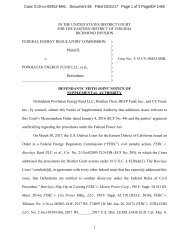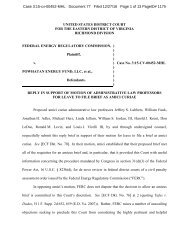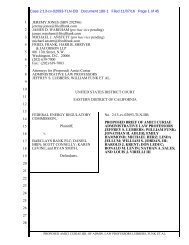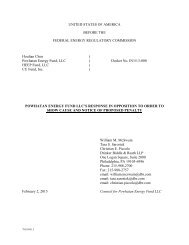FERC-Response-03-24-17
FERC-Response-03-24-17
FERC-Response-03-24-17
Create successful ePaper yourself
Turn your PDF publications into a flip-book with our unique Google optimized e-Paper software.
Case 3:15-cv-00452-MHL Document 84 Filed <strong>03</strong>/<strong>24</strong>/<strong>17</strong> Page 12 of 30 PageID# 1431<br />
The Petitioner’s construction of Section 31(d) is consistent with the ACUS’s<br />
recommendation that formal APA-style hearings be available, but that they need not be the<br />
exclusive mechanism for administratively-assessing civil penalties. The Petitioner’s construction<br />
also furthers the values of fairness (especially by allowing respondents to determine their own<br />
adjudicative path), efficiency, utilization of the agency’s “specialized knowledge,” and “greater<br />
consistency of outcomes,” which led both the ACUS and the ABA to endorse the administrative<br />
assessment of penalties in the first place. Though Amici purport to rely on the ACUS<br />
Recommendations, they fail to account for this vital context.<br />
II.<br />
Amici Ignore the Primacy of the Commission’s Role in Administering a<br />
Comprehensive Regulatory Scheme Under the FPA.<br />
Despite purporting to root their construction of Section 31(d)(3) in, among other things,<br />
the FPA’s “structure and purpose,” Amici have nothing to say about the Commission’s<br />
preeminent role in administering the comprehensive regulatory scheme established by the FPA.<br />
That role has been consistently acknowledged by the courts, which have found that the<br />
Commission has primary or exclusive jurisdiction to address issues arising under the FPA, and is<br />
reflected in the very language of the statutory provisions at issue here, which provide that the<br />
initial penalty assessment be made by the Commission no matter which procedural path is taken.<br />
Amici’s failure to acknowledge the context and purpose of the FPA, or the Commission’s role in<br />
it, fatally undermines their proffered construction of the statute, which would give respondents<br />
the ability to avoid the Commission’s authority and expertise altogether. Food Town Stores, Inc.<br />
v. EEOC, 708 F.2d 920, 9<strong>24</strong> (4th Cir. 1983) (“A statute must be interpreted to give it the single,<br />
most harmonious, comprehensive meaning possible in light of legislative policy and purpose.”).<br />
By contrast, Petitioner’s view accords with the Supreme Court’s recent recognition of the<br />
complexity of electric markets, and the primacy of the Commission’s role in regulating those<br />
7






